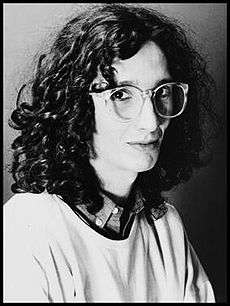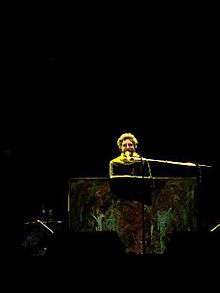Fito Páez
Rodolfo Páez Ávalos, popularly known as Fito Páez (Spanish pronunciation: [ˈfito ˈpaes]; born 13 March 1963), is an Argentine popular rock and roll pianist, lyricist, singer-songwriter and film director.
Fito Páez | |
|---|---|
.jpg) Fito Páez in 2014 | |
| Background information | |
| Birth name | Rodolfo Páez Ávalos |
| Born | 13 March 1963 Rosario, Argentina |
| Genres | Rock Pop |
| Occupation(s) | singer-songwriter, film director |
| Instruments | Singing, piano |
| Years active | 1979–present |
| Labels | Warner Music/Distribuidora Belgrano Norte/Sony Music |
| Website | www |
Biography
Early career

Paez was born in Rosario, Santa Fe Province; his real name is Rodolfo Paez, like his father. When he was a child people called him "Rodolfito" (in Spanish, an affectionate form of "Rodolfo") to distinguish him from his father. With the passage of time, this nickname became just "Fito", and that is where his stage name came from.[1]
He formed Staff, his first band when he was 13. In 1977, he played in El Banquete with Rubén Goldín and Jorge Llonch. He began to perform solo in pubs the following year.
Straight out of high school, he began touring with several bands and soon after that produced his first solo album, Del '63, which was released in 1984. It was promoted first in his home town, but later earned attention in Buenos Aires. The recording was put together with the help of some of Argentina's most prominent musicians, including Daniel Wirtz, Fabián Gallardo, Tweety González and Paul Dourge. The disc won him critical acclaim as a songwriter and helped lead to future projects, including a 1985 album, Giros. The demo of that album earned him the praise of Luis Alberto Spinetta, as well as a partnership – Paez's next album, 1986's La La La was a duet with Spinetta. The duo supported that album with a tour that reached all the way to Santiago, Chile. The same year, he participated in the Thousand Days of Democracy festival.
His 1987 recording, Ciudad de Pobres Corazones, marked a dark, political turn for his work. It was dedicated to the memory of his aunt and grandmother, who were assassinated in Rosario. Páez got his first taste of production work with Ey!, which was released in 1988. Recorded in New York City and Havana, it also showcased many musicians with whom he had worked previously.
1990–present
Tercer Mundo, released in 1990, explored Latin American cultural influences and the harsh world of poverty and exploitation. It too was critically acclaimed, but it was Páez's 1992 album, El Amor Después del Amor which marked the pinnacle of his commercial success. The album sold more than 750,000 copies and when Páez toured to support it, he found himself playing to sold-out shows for 40,000 people. Shortly after this album's release, he played a benefit concert for UNICEF which raised more than $420,000.
The follow-up, Circo Beat, had impossibly high expectations and though it had several hit songs, including "Mariposa Tecknicolor" and "Tema de Piluso," as well as a companion album, Circo Beat Brazil, which featured Brazilian remixes of its hits, it only sold around 350,000 copies. Several other projects were completed in the late '90s, including a live album, Euforia and 1998's Sabina & Páez: Enemigos Intimos, with Joaquín Sabina. The year 1999 brought another balanced, superbly produced album, Abre. He also took home two Grammys at the first annual Latin Grammy Awards in fall 2000. He lived with Argentine actress Cecilia Roth for some years; the couple adopted a child in 1999.
Páez's 2003 album Naturaleza sangre marked a return to his musical past, featuring appearances from Charly García, Luis Alberto Spinetta and Brazilian artist Rita Lee on the previously unreleased version of "Ojos Rojos". In 2006, Páez was given an escopetarra (a decommissioned AK-47 converted into a guitar) by Colombian musician and peace activist César López in honor of his music.[2]
The album El mundo cabe en una canción won the Latin Grammy Award for Best Rock Solo Vocal Album at the Latin Grammy Awards of 2007. In 2008 Páez recorded, No se si es Baires o Madrid, in Madrid, Spain. He invited several important musicians such as Pablo Milanés, Joaquín Sabina and Ariel Rot to participate. In 2010, he released the album Confiá.. In December 2011 he recorded a new album with songs by other artists performed by Páez himself in a release called Canciones para áliens.[3] This album was presented at la Sala Nezahualcoyolt de la Universidad Nacional Autónoma de México. In January 2012, these "songs for the aliens" were transmitted to space via electromagnetic waves through the Music to Space project.[4]
Discography
Studio albums

- Del 63 (1984)
- Giros (1985)
- La la la (1986) (with Luis Alberto Spinetta)
- Ciudad de pobres corazones (1987)
- Ey! (1988)
- Tercer mundo (1990)
- El Amor Después del Amor (1992)
- Circo Beat (1994)
- Enemigos íntimos (1998) (with Joaquín Sabina)
- Abre (1999)
- Rey Sol (2000)
- Naturaleza sangre (2003)
- Moda y pueblo (2005)
- El Mundo Cabe en Una Canción (2006)
- Rodolfo (2007)
- Confiá (2010)
- Canciones para Áliens (2011)
- El Sacrificio (2013)
- Dreaming Rosario (2013)
- Yo Te Amo (2013)
- Rock and Roll Revolution – RRR (2014)
- Locura total (2015) (with Paulinho Moska)
- La ciudad liberada (2017)
- La Conquista Del Espacio (2020)
Live albums
- Euforia (1996)
- Mi vida con ellas (2004)
- No sé si es Baires o Madrid (2008)
- El amor después del amor 20 años (2012)
Collaboration albums
- La La La (with Luis Alberto Spinetta) (1986)
- Enemigos íntimos (with Joaquín Sabina) (1998)
- Locura total (with Paulinho Moska) (2015)
Compilation albums
- Grandes éxitos (1990)
- Crónica (1991)
- Lo mejor de Fito Páez (1993)
- Lo mejor de los mejores – Volume 1 and 2 (1995/1996)
- Lo duro/Lo suave de Fito Páez (1996)
- Colección aniversario (1999)
- Fue amor (2000)
- Antología (2002)
- Serie de oro: grandes éxitos (2002)
- Músicos, poetas y locos (2003)
- Super 6 (2003)
- Gran reserva (2005)
- Grandes canciones (2008)
Tributes
- Homenaje a Fito Páez (2006)
Filmography
- Vidas privadas ("Private lives") (2001)
- ¿De quién es el portaligas? (2007) ("Whose is the garter belt?")
References
- Symns, Enrique (1995). Páez. Espasa Calpe, Buenos Aires. ISBN 978-950-852-099-9
- Latorre, Héctor (24 January 2006). "Escopetarras: disparando música". BBC World. Retrieved 31 January 2007.
- https://web.archive.org/web/20130117074234/http://sonymusic.com.ar/DetProducto.asp?Pro_Codigo=7995062
- es:Canciones para aliens
Further reading
- Horacio Vargas: Fito Páez – La biografía – La vida después de la vida. Homosapiens, Buenos Aires 1994; ISBN 950-808-044-2.
External links
- Official website

- Fito Páez discography at Discogs
- (in Spanish) Fito Páez Biography (1/5) YouTube.com